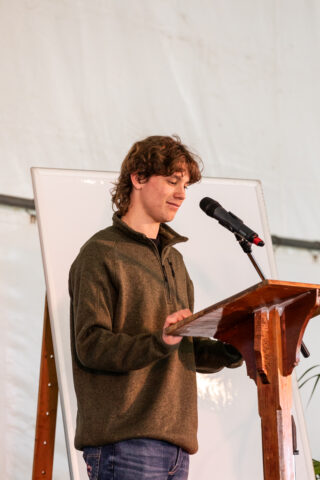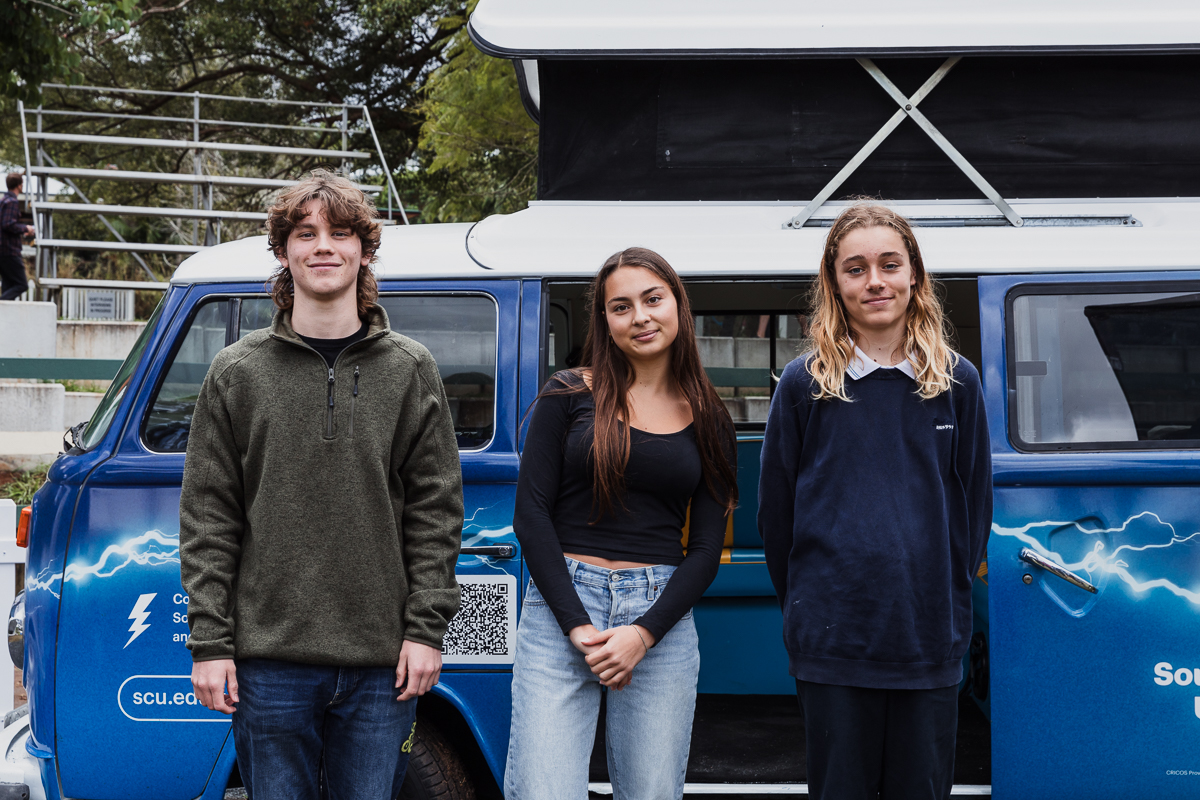Congratulations to our Student Writing Prize Winners.
A big congratulations to our winners, runners-up and everyone who submitted their stories to our annual Student Writing Prizes.
We received 138 submissions across the three categories for the Southern Cross University Writing Prize, the Susie Warrick Young Writers Award and the Jesse Blackadder Prize.
Winners and runners-up were presented with their awards at Byron Writers Festival by Zanni Louise, Hilarie Dunn, Professor Amy Cutter-Mackenzie-Knowles and Dr. Lynda Hawryluk.
A huge thanks to our judges, Jessica Alice, Kym Crane, Dr. Aidan Coleman, and Ella Peile, who expressed that she and the other judges were impressed by the maturity and artistry of the shortlisted stories. “It was a privilege to read such thoughtful original writing.”

Now, it is our pleasure to share with you some of the awesome work of our runners up.
The sun ascended over the peculiar town of Auralie, casting a warm glow across the wonky houses and scattered alleyways. Anna sat on the roof of a diner, overlooking the blissful morning. Anna was strange. She had no family, and no memory of a home.
A clock chimed lustily, causing the neighbourhood to stir. Soon enough, the whole town was alive with a buzzing energy. Anna breathed in the cool air and jumped down, planting her feet on the rough cobblestones, ready for adventure!
Anna hadn’t been walking long, but her legs already felt achy and tired, so she leaned on a cold brick wall to rest.
After a while Anna had an idea. She was different from other people, as you know, but she had a big secret. She could travel between different realms. Anna didn’t use this unique power often, but she felt today was a good day to practice.
Sometimes Anna went to bad places, scary places that gave her nightmares for weeks. Other times she went to magnificent places of rare beauty, that should only be possible in your favourite dreams. Today, Anna wanted to go somewhere new. She closed her amber eyes and felt for the tug of a new place, branching out, following her curiosity. This helped her travel.
A strong wind rushed past, a sign that a gate to somewhere was opening, so Anna breathed out and let it take her away. When she opened her eyes, she was in a zoo. Different from the ones that you would have seen, this zoo housed a three-headed gosling, a miniature elephant and a Unicorn with soft, white fur and a shimmering horn. Boring, thought Anna, next!
Before she knew it, Anna was in a beautiful place, but it felt familiar. The rolling, grassy hills and waves sweeping down the long headlands welcomed her. Boring again. Anna closed her eyes and tried to open another gate.
Wait, what? It didn’t work. Anna shrugged and decided to rest and try again later. She had been lying on the shore of a sandy beach for about an hour when she felt a blunt stick shove into her side. She jolted up right to see an elderly lady before her. The old lady eyed Anna and beckoned her to follow. Anna wasn’t sure if she should, but she felt intrigued by the lady’s appearance, so she did.
Soon they came to a place Anna assumed was the old lady’s house. They went inside. The lady lived in a sweet little bungalow, the walls were coloured by old wallpaper of interesting patterns, and trinkets lined the crooked wooden shelves that surrounded the room. Another wave of familiarity swept over her. Anna sat down with the lady. “I’m Heidi,” said the lady.
“I’m Anna”, “I know” Heidi responded.
“I’ve been waiting for you to return.”
“From where?” said Anna.
“That’s not important.”
The old lady smiled, paused and said, “all that matters is that you are home.”
The chicken saw Bobbi reaching for her meagre supply of eggs. It didn’t like this. It pecked her fingers.
“Oh, piss off!” Bobbi murmured under her breath. Crimson soaked into the earth. Oh well, she’d got what she came for. Leaving the chicken coop, she paused to gaze at the landscape around her: long lines of barbed wire sinking into the green hills in the distance. What caught her attention most was the turbines, fresh and new, standing lonely in the sepia fields and paddocks all around her, slowly spinning in the cool afternoon breeze. She hated them. The ones in her and Benjamin’s property they were forced into out of peer pressure; what would the neighbours think if you refused the turbines; they were ‘for the planet’. All of it: the electric tractors, the limit on crop output, she didn’t understand it and didn’t know why she didn’t. But then there was her. She looked down at the bulge in her stomach. The baby – though she didn’t have a name yet – would be living in this world, she couldn’t forget that. She began walking back to the house as twilight began to encompass the open sky around her in hues of scarlet and dusky blue. In accompaniment, music began playing from the house. Way. Too. Loud.
“Jolene, Jolene, Jolene, Joooleeene, I’m begging of you please don’t take my man.”
She reflected that that was something she never needed to worry about. Benjamin was her man, a beautiful, kind, caring man, if a little deaf.
You could have your choice of men
But I could never love again
He’s the only one for me
Jolene
The car hummed silently beneath her. Spread far and wide around was the land she’d grown up in – flat lands of cattle and pasture and loneliness and rugged hope, always surrounded by hills a little greener than her paddock.
And from the stereo: “Jolene, Jolene, Jolene Jooooleeeeeeennee.”
It was her secret guilty habit. People would think her narcissistic if they knew, but Dolly Parton singing her name always made her feel better. Especially at times like this.
She kept replaying his words in her head: “Jolene, it’s been amazing with you, and you’re a great person…but.” It continued for a time in her head, but after a while Dolly and the gentle swish of the families of wind turbines outside blocked him out. She sighed and sank back in her chair, letting the car drive itself for a bit, through the window she could see her old house in the distance.
“Oh, hello Darlin’,” said her father as he opened the door that had sat in that frame since she’d lived there. Seeing her despondence, he said in his backyard Australian accent,
“Come on let’s have a cuppa and talk for a bit, I was about to feed the chickens but that can wait.”
Walking out to the coop she reminisced on her time in this house. All those years before she grew up and moved to the city. Back then the property had been bigger; dad had sold some of it when Bobbi had died. She felt sorry for him all alone out here, but she thought he seemed content living in past memories in this old house.
Whenever something was up with her, or she needed to get away she’d make the 3-hour drive from Melbourne to come and see him and stay on the farm. She thought he enjoyed her company more than she let on; they’d always been close. She remembered when more wind turbines started cropping up and petrol got more expensive from everyone buying electric: her mom would tell her of a world different to Jolene’s, where things like electric self-driving cars and plastic bans and the turbines where just a thing that happened in the city, before the whole world began to change.
It occurred to Jolene that it must have taken a lot of courage having a child in a world that was slowly but surely transforming around her. It must have taken a lot of courage to just be herself in a world that was always changing.
As she fed the chickens, she felt a tear slide down her cheek and sink into the earth beneath her. “Why does everything slip away so fast?” She whispered.“Who is even here for me but him?” She asked the chickens.
One chicken looked up at her, a hen, brown, met her eyes and stared at her for a second, then pecked the ground.“I guess you’re right there,” said Jolene, picking up the scores of eggs the hen had laid, “At least we still have the planet.”
My sink is piled with dishes, a dotted trail of ants crawling over the crusted bowls of dried soggy weetbix, drips of golden honey sliding down the sides. My phone vibrates from the kitchen counter, stirring me from my reverie. ‘Five new emergency warning fires located near you’ the vivid headline reads. My stomach churns with overwhelming anxiety as reality sets in, bush-fires consuming this country, burning relentlessly, ‘Control fires out of control’.
I stare out the window and press my cheek against the cool glass; the air is stifling and my thin linen dress sticks to me as sweat drips down my face. I clutch my girl’s small sticky hand, her button nose sprinkled with brown freckles and her cheeks pink and hot. Her deep umber eyes are mournful and scared as we watch from our apartment.
The sun is barely visible in the crimson sky, a blurred orb of hazy orange, desperately shining through the thick smoke. Flurries of singed, blackened gum leaves fall from the sky, the tears of nature as she burns. I plug my cheap plastic fan into the wall of the dark dingy apartment, it whirs, pushing the putrid heat around the small apartment. I feel a gentle kick in my stomach and place a hand upon my swollen belly. I cannot help but wonder if my children will know the Australian bushland the way that I know it.
I long for them to have a childhood like mine, spent in the Australian bush, an infestation of greens and browns, not particularly beautiful to those who do not know it but unapologetically intriguing. My days spent running around barefoot, feet caked in the rich red volcanic dirt. Chewing on lomandra stems, the subtle nutty flavour dancing across my taste buds. The blistering sun on my bare face before I would bite into tarty lilly pillies, flavour bursting across my tongue. Crushing lemon myrtle leaves between my fingers and letting the sweet-sharp scent wash over me. Will they spend their days as I did, stripping back the paperbark to reveal the shiny pink layers beneath and scratching their names into the flaky trunks? Will the warm and tender spring breeze carry the scent of honeyed wattles to their noses?
Or will the bush cease to exist, the land’s unique tranquillity and rugged beauty gone? But I know that it’s not too late. I see the determination in my daughter’s eyes. Feel the strength of my son from within. We can still transform our world. I unplug the fan and succumb to the sweltering warmth. I hold my heavy stomach, my warm sweat mingling with the smoky air. This feels like the end but it’s only the beginning, a chance to right what has been wronged, a chance to truly listen to the oldest surviving culture. The knowledge of land is still here, living in these peoples, their culture as rich and as vibrant as the red soil that stained my bare feet as a child.
– How great were those!

